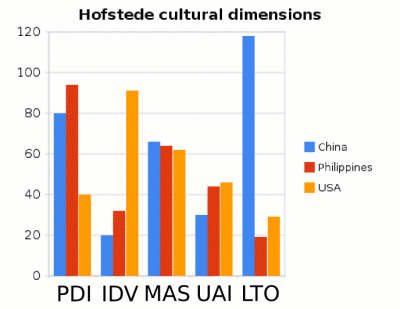Hofstede cultural dimensions
My friend and individuals can act out of type for their nationality - but this doesn't claim to be anything more than what it is; a broad, sweeping overgeneralization of the dominant national culture - as Hofstede found it, anyway.
Since you can only compare two countries at one time on Hofstede's website, I whipped up a quick chart. The labels, from left to right, stand for Power Distance Index (the acceptance of uneven distribution of power), Individuality, Masculinity (the relative value placed on stereotypically male or female personality characteristics and actions), Uncertainty Avoidance Index, and Long Term Orientation.

The first two things you notice are the Huge! Orange! Bar! by IDV and the even more gigantic blue one by LTO. That's America being insanely individualistic and China shooting for a long term view, respectively.
This could explain conversations like the one I had with my grandmother this morning about renewing the lease on my great-grandparents' tomb in the Chinese cemetery, which expires in... either 25 or 50 years, we're not sure. Her response was that well, we'd need to call the council of elders together, and then ask all their children, and then tell my generation, and so on. It also explains why my parents talked to me as a young kid (early elementary school) about the importance of saving money to put my future children (which I shall of course have) through college, and so forth.
I could pull out other stories to illustrate the other parts of this chart here, but that's all ex post facto - I can pull out stories to illustrate almost any "fact" I want most of the time. I do see the first column's gap here, though - and it's the one that rubs up against me the most. As a nicely-dressed Chinese, I'm allowed entry into pretty much everywhere, even without ID in most cases. Less well-dressed Filipinos are chased away by security guards or made to line up by entrance gates for identity verification. (On the flip side, it's "safe" for them to run around on the streets, whereas I'm confined to quarters because it's "too dangerous" for me to go outside - so we have as hard a time entering their world as they do entering ours.)
After four whirlwind-filled years of college, I'm used to brazenly batting ideas around with folks with impressive-sounding titles - they're people, after all, and when I get really into a conversation or I'm really passionate about a topic, I don't care what their nametag says. It also makes me incredibly uncomfortable treating people as anything less than an equal. I can still get away with that here to some extent; I'm the American balikbayan, young and impetuous (and tall), and (if all else fails) an engineer and therefore a geek, so my lack of "conventional social graces" turns into a point of humor and even endearment. (I'm sorry, but I make eye contact and speak in sentences rather than statements that trail into questions?)
The discrepancies only crop up occasionally, but they jar me when they come. I squirm whenever I hear a well-to-do person talk pityingly (or denigratingly) about "the poor," as if they were a homogenous lump of helpless and/or lazy shiftless bums. It means I'm having a hard time getting used to being served, and a hard time adjusting to the submissiveness of those doing the serving. (And I flinch whenever I hear a grown person in the "lower classes" referred to as a "boy" or a "girl," and try to make a point of saying "man" and "woman" in my own speech.)
Problem: The gap between social classes is sufficiently ingrained that it makes them uncomfortable when I act as if we were equals. And when in Rome - right? What's the line between "a righteous crusade of JUSTICE! and FREEDOM!" and just plain ol' blind cultural imperialism?
It certainly keeps life interesting. And it makes for memorable conversations - like when my (female) cousins were astonished to find that you can keep your last name! when you get married! ("I'm going to move to the US so I can keep my last name!" one exclaimed excitedly) and another time when I was equally astonished to find that it's legal here to specify gender* for a job posting and require all applicants to submit** a picture*** of themselves. It was explained to me that sometimes men and women had different characteristics - women are more nurturing and make better nurses, etc. I replied that the current statistics might make certain combinations more likely than others, but that wasn't the same thing.
Conversations like that usually end up with a shrug and a "yeah, I know, but what can you do? It's the
*obviously, sometimes gender does give you an advantage - a job posting for a wet nurse or a sperm donor, for example. But I can't for the life of me figure out why a construction supervisor should be a man, or a secretary a woman, and was puzzled why my gender should keep me from applying to some engineering positions I saw posted. To be fair, while many job postings specify gender (and height), many don't.
** "pix plz"
***even for non-customer-facing jobs. I mean, if you're auditioning for a play, I can understand why you'd want headshots, but do I care whether my programmer's gorgeous?